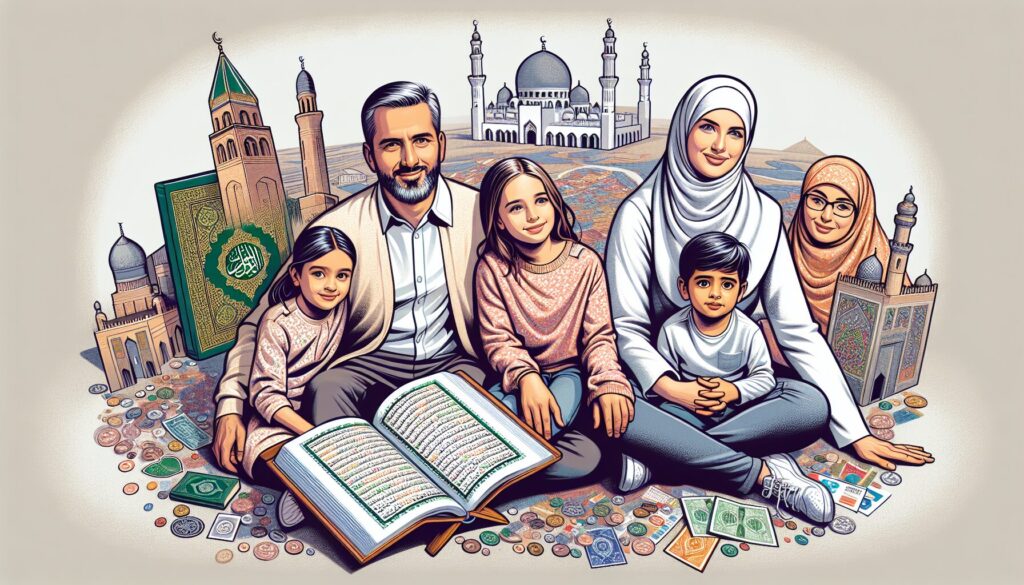A few years ago, I attended a cultural exchange event in Melbourne and engaged in a memorable conversation with a gentleman from a diverse background about Islamic values. This encounter highlighted the importance of respectful dialogue, where one listens more than speaks and seeks understanding rather than making assumptions. Such dialogue is crucial when discussing rich and diverse topics like Islamic values. It involves creating an environment where everyone feels heard and valued, approaching conversations with empathy, and actively listening. If uncertain about a belief or practice, asking questions for clarity is encouraged, as the goal is to exchange ideas, not to debate. It’s important to avoid stereotypes or generalizations and instead focus on individual experiences and stories, which offer a nuanced view. By fostering this approach, we open doors to meaningful and enriching conversations.
1. Assuming Homogeneity in Islamic Beliefs

It’s a common mistake to assume that all Islamic beliefs are the same. This can lead to misunderstandings and missed opportunities for real connection. Just like how Melbourne boasts a variety of coffee shops each with its own unique flavor, Islamic beliefs are diverse and beautifully varied. Digging into this diversity can be as rewarding as finding that local café that serves the perfect flat white.
To illustrate, consider the way people in different Australian states might approach a barbecue. Some might prefer a classic sausage sizzle, while others are all about those fancy marinated kebabs. Similarly, Muslims around the world, and right here in Australia, have different interpretations and practices of their faith. It’s a rich tapestry of beliefs and traditions, influenced by culture, personal experience, and even geography.
Understanding this, let’s look at a few key points:
- Diverse Interpretations: Not all Muslims interpret Islamic texts in the same way. Just like how two people can see the same painting and feel entirely different emotions, interpretations of religious teachings can vary greatly among individuals and communities.
- Cultural Influences: The cultural background of a Muslim community often shapes how Islamic values are practiced. For instance, the Islamic practices in Indonesia may differ from those in Turkey, much like how the beach culture in Sydney differs from the artsy vibes of Melbourne.
- Individual Beliefs: Every Muslim is an individual with their own personal beliefs. Assuming homogeneity ignores personal experiences and stories that shape how someone practices their faith.
To foster respectful dialogue, it’s essential to approach conversations with an open mind and a willingness to listen. Organizations such as Islamic Council of Victoria and Australian Federation of Islamic Councils can provide valuable resources and support in understanding these differences.
Respectful communication is key. It’s important to ask questions and listen genuinely, without making assumptions. When you do, you’ll find that people are often eager to share their unique perspectives. And in doing so, you enrich your understanding and appreciation of the vibrant tapestry of Islamic beliefs and practices.
2. Focusing Only on Media Narratives
While chatting with friends about important topics, it’s easy to fall into the trap of relying solely on media narratives. So, let’s dive into why this is a common mistake when discussing Islamic values.
Media outlets often simplify complex issues to make them digestible for a broad audience. However, this simplification can lead to skewed perceptions. Imagine hearing only one side of a story repeatedly; it shapes your understanding, even if unintentionally. This is why focusing solely on these narratives can be misleading.
To broaden the perspective and foster a more comprehensive understanding, it’s crucial to seek information from a variety of sources. Here’s how you can do that:
- Engage with Community Organizations: Local groups like the Islamic Council of Victoria provide valuable insights and host events that encourage open dialogue. These interactions can offer firsthand experiences that media coverage often lacks.
- Attend Educational Workshops: Many organizations, including the Australian Federation of Islamic Councils, host workshops and seminars. These are excellent opportunities to learn directly from experts in the field.
- Explore Faith-based Literature: Reading books written by Islamic scholars can provide depth that a news article might miss. This literature often covers the nuances and context behind Islamic values.
Furthermore, engaging in conversations with individuals from different backgrounds can enrich your understanding. Hearing personal stories and experiences allows you to see beyond the headlines. For example, while enjoying a community event at the local mosque, I overheard a captivating story that completely shifted my perspective on a particular issue. These personal exchanges are invaluable.
Additionally, the media can sometimes focus on divisive topics, which might not reflect the everyday realities and values of a community. By seeking diverse viewpoints, you can avoid falling into the trap of these narrow portrayals. If you’re interested in discovering how to incorporate some of these values into daily life, check out our guide on practical halal meal planning for busy families.
This need for a broader perspective isn’t just about fairness; it’s about building a well-rounded understanding. By moving beyond media narratives, we foster respectful dialogues and enrich our conversations around Islamic values.
3. Ignoring Historical and Cultural Context
Ignoring the historical and cultural context when diving into discussions about Islamic values is a mistake that can lead to misunderstandings. Every religion, including Islam, has a rich tapestry of history and culture that influences its values and practices. Overlooking this can make discussions one-dimensional and less meaningful.
Consider the unique cultural landscape of Australia. It’s a melting pot of diverse cultures, each adding its own flavor to the broader Australian identity. When discussing Islamic values here, it’s crucial to recognize how these values have adapted and integrated into the local culture. For instance, the ways in which communities in Melbourne have embraced both their Islamic heritage and the Australian way of life is a fascinating blend of old and new.
Historical context is just as important. Islamic values have been shaped by centuries of history, from the early days of Islam in the 7th century to its spread across continents. These historical influences affect how values are understood and practiced today. Ignoring this context can lead to a shallow understanding of complex concepts.
Why Context Matters
Understanding the historical and cultural backdrop can enhance discussions about Islamic values, fostering more respectful dialogue. Here are a few reasons why context is key:
- Rich Background: Recognizing the historical journey of Islam helps us appreciate the depth and richness of its values.
- Cultural Integration: Understanding how Islamic values integrate within the Australian context makes discussions more relevant and meaningful.
- Respectful Engagement: Being aware of historical and cultural nuances encourages respectful and informed dialogue.
Organizations like the Islamic Council of Victoria and the Australian Federation of Islamic Councils actively promote this understanding through various community programs. They highlight how historical and cultural contexts influence Islamic practice today. Engaging with these perspectives not only enriches our conversations but also builds bridges between communities.
Islamic scholars, too, play a vital role in interpreting values in the context of contemporary issues. By considering their insights, we gain a more nuanced view of how these values can be applied in today’s world. This approach helps avoid common mistakes discussing Islamic values, ensuring that our conversations are informed and respectful.
Conclusion
Ultimately, fostering respectful dialogue about Islamic values requires openness, a willingness to learn, and an appreciation for the diversity and richness of individual experiences. By moving beyond assumptions, media narratives, and overlooking historical context, we pave the way for deeper understanding and connection. Engaging with community organizations, exploring diverse literature, and appreciating the unique blend of cultures enrich our conversations and build bridges across differences. Keep embracing the journey of understanding and celebrating diversity in every dialogue. Cheers to meaningful conversations!
Continue Exploring
Embark on a journey of fun and faith with activities that bring Islamic values to life for the whole family. Discover enriching experiences that nurture spirituality and togetherness.
Frequently Asked Questions
Why is it important to avoid assuming homogeneity in Islamic beliefs?
Assuming homogeneity in Islamic beliefs can lead to misunderstandings and missed opportunities for genuine connection. Islamic beliefs are diverse, influenced by culture, personal experience, and geography. Recognizing this diversity allows for more meaningful and respectful dialogue.
How can I ensure a well-rounded understanding of Islamic values beyond media narratives?
To gain a well-rounded understanding of Islamic values, it’s important to engage with community organizations, attend educational workshops, and explore faith-based literature. These sources provide insights and depth that media coverage often lacks, enabling you to appreciate the nuances of Islamic values.
Why is considering historical and cultural context important when discussing Islamic values?
Considering historical and cultural context is crucial because Islamic values have been shaped by centuries of history and cultural influences. This context enriches discussions, making them more relevant and meaningful, and fosters respectful and informed dialogue.
Fatima Ansari is an Islamic educator and writer with over a decade of experience teaching Quran and Islamic studies to children and families in Western Muslim communities. Growing up in North America, she saw firsthand the challenges Muslim families face in balancing faith with modern life, which inspired her to share practical guidance rooted in the Quran and Sunnah. Her mission with E-Quran Learning is to make Islamic education accessible, relatable, and inspiring for Muslim families across the United States, United Kingdom, Canada, Australia, and New Zealand.






